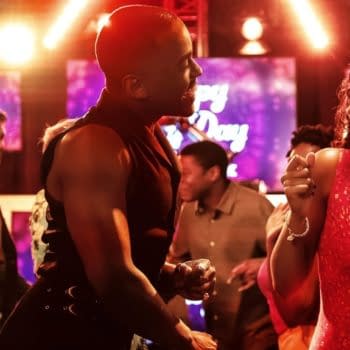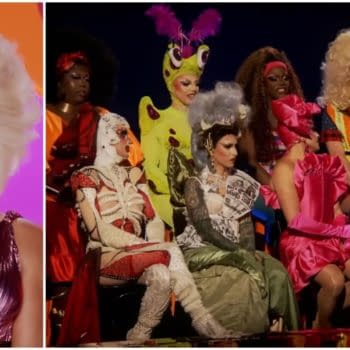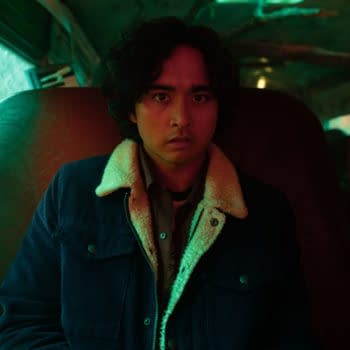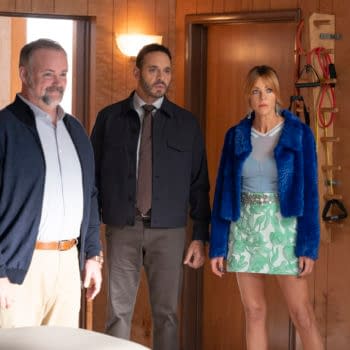Posted in: HBO, TV | Tagged: alicia vikander, better call saul, Fala Chen, HBO, Irma Vep, Kristin Stewart, Les Vampires, Maggie Cheung, Olivier Assayas, Vincent Macaigne
Irma Vep Ends on Poetic, Poignant Note With The Last Ghost Standing
Irma Vep was leading to this. Olivier Assayas' meta hall of mirrors spins to an ending that is both unpredictable and inevitable as the series plays out its examination of Cinema history, show business satire, the chaotic nuances of creating Art, and how Art ultimately creates ghost stories. Does Mira (Alicia Vikander) lose herself in Irma Vep? Does Rene (Vincent Macaigne) manage to finish shooting his remake of Les Vampires and exorcise his demons?
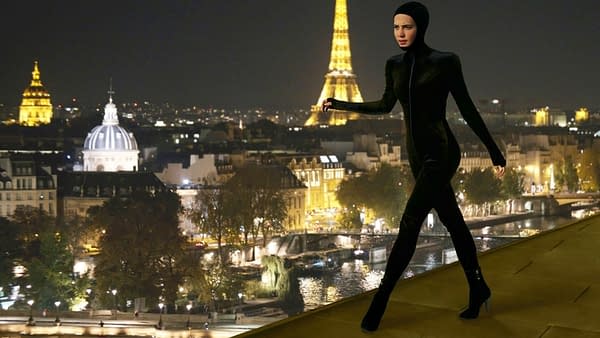
Kristin Stewart appears as Lilianna, Mira's ex's current girlfriend, a pop star who laments that her kids and pre-teen fans are outgrowing her while adults like their parents would never take her seriously. She brings up the recurring theme in the series about the artist's need to create Art that fulfills them and the conflict with commercial demands that bring them fame and money. Assayas had based much of Mira's story on details from Stewart's life as a movie star, so Irma Vep forms a loose trilogy with Clouds of Sils Maria and Personal Shopper with Stewart.
There's a melancholy sense of things coming to an end. The production heads towards its conclusion with the dysfunctional family ready to disband. Cynthia Keng (Fala Chen) asks Rene to release her early after her last big scene because she's grown homesick for Hong Kong. Considering Chen played Shang-Chi's mom as that hoary stereotype of the wise, self-sacrificing Chinese mom who knows kung-fu, it's refreshing to see her play an ordinary, fully-formed contemporary woman with contradictions, an unflappable sense of humour, and reveling in her own sexuality. Mira talks out her flirtation with costume designer Zoe (Jeanne Balibar) and starts to come to terms with her heartbreak over her toxic affair with her former assistant Laurie.
Irma Vep dies at least three times in the finale: in the ending of the original silent movie, in the re-enactment of the filming of her death scene from original actress Musidora's memoirs, and in the remake that Rene films with Mira. Irma Vep still has a life beyond the screen, as Rene has insisted. She is an archetype, the original femme fatale of Cinema who inspired all the ones who came after her. Spirits, Rene tells Mira, represent what we lack or what is dead inside us. He has been using Irma Vep to exorcise his sadness over the disappearance of his ex-wife Jade Lee from the world of Cinema and his unspoken guilt that it might be his fault.
As with the 1996 movie, Mira disappears once she wraps production, evading plans other people made for her. Gautier, the fashion brand that financed Rene's remake of Les Vampires as a loss-leader to entice her to be their spokesperson, finds she's slipped from their grasp when she takes off to star in a major movie with a director every actor dreams of working with, from an acclaimed book. Mira tells Rene that playing Irma Vep has rekindled her passion for acting as much as she fought to pull him back from the abyss of despair and self-doubt to finish filming. It's self-doubt that drives artists to create major work, after all. That's why supremely confident directors like Herman create hacky Hollywood blockbusters. There's no telling whether Rene's remake of Les Vampires will be successful or even liked – the kids think he's a has-been and are sniffy about a remake of a silent movie but are turned on by the idea of seeing Mira running around in a catsuit. So… mission accomplished?
The series reminds us that arthouse movies are about the directors' personal obsessions and anxieties, as opposed to more commercial shows like, say, Better Call Saul, which explore themes no less complex but aren't necessarily the creators' personal statements. Both types of shows are at the top of their game, but Irma Vep is that rarer beast: the vision of a single creator. The story ends with Rene Vidal, Assayas' stand-in coming out of production with his doubts and madness subsiding. He's wistful as the production ends and the makeshift dysfunctional family scattered to the winds. He returns to reality and sanity, and his wife can come home with their kids without having to put up with his madness. He has achieved some peace with the spirit of his ex-wife Jade Lee, just as the show has enabled Assayas to connect with Maggie Cheung again after ten years and find some peace with the end of their marriage and her leaving the film industry.
In the end, Mira is gone. Her time as Irma Vep is over, so she disappears. She may have stopped being Irma Vep, but Irma Vep is now her, renewed and recharged, a spirit watching over the city. Irma Vep is the spirit of Paris: amoral, chaotic, sensuous, unpredictable, and alone, always waiting in the shadows. It's the most poetic ending of any show in 2022.
Both the 1996 movie and 2022 TV series of Irma Vep are streaming on HBO.







